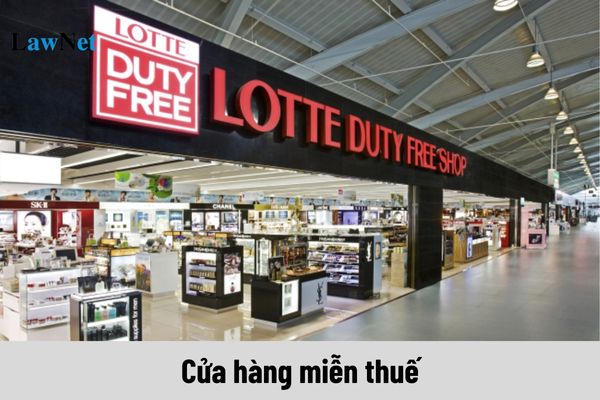What is a duty-free shop? What currency is used in duty-free sales transactions in Vietnam?
What is a duty-free shop in Vietnam?
According to Clause 1, Article 3 of Decree 68/2016/ND-CP stipulating duty-free shops, it is defined as follows:
Definitions
In this Decree, the following terms are to be understood as follows:
1. A duty-free shop is a location for storing and selling goods of imported origin, produced domestically, to subjects eligible for preferential tax policy treatment according to the legal provisions.
…
According to the above regulation, a duty-free shop is understood as a location for storing and selling goods of imported origin, produced domestically, to subjects eligible for preferential tax policy treatment according to the legal provisions.
As per the stipulation in Clause 1, Article 4 of Decree 68/2016/ND-CP (amended by Clause 2, Article 1 of Decree 67/2020/ND-CP), duty-free shops are located in the following positions:
- In the isolation areas of international land border gates, international railway stations, type 1 seaports; in the isolation and restricted areas of international civil aviation ports;
- In the inland territory;
- On aircraft operating international flights by airlines established and operating under Vietnamese law;
- Duty-free warehouses located at the same position as the duty-free shop or within isolation areas, restricted areas, or border gate areas or within customs operational areas outside of border gates as stipulated in Article 8 of Decree 01/2015/ND-CP and Clause 3, Article 1 of Decree 12/2018/ND-CP.

What is a duty-free shop? What currency is used in duty-free sales transactions in Vietnam? (Image from the Internet)
What goods are sold at a duty-free shop in Vietnam?
According to Article 6 of Decree 100/2020/ND-CP, goods available for sale at duty-free shops include: Temporarily imported goods from abroad, non-tariff zones, bonded warehouses; domestically circulated goods permitted under Vietnamese law.
In detail:
- Temporarily imported goods from abroad, non-tariff zones, and bonded warehouses that are sold at duty-free shops are items not on the list of goods banned or suspended from import under foreign trade management legal provisions.
- Domestically available goods allowed for circulation under law brought into duty-free shops must not be items on the list of goods banned or suspended from export. In the case of conditional export goods, they must meet the conditions stipulated by law.
Domestically available goods allowed for circulation under Vietnamese law that are brought into duty-free shops are managed and supervised by customs authorities based on notifications of goods lists brought into duty-free shops and warehouses by duty-free business enterprises.
Goods sold at duty-free shops must be stored at the duty-free shop, within the duty-free warehouse of the duty-free goods seller.
The duration of storage for goods at a duty-free shop is regulated at point a, clause 2, Article 47 of the Customs Law 2014, specifically:
- The storage period for goods should not exceed 12 months from the date the customs formalities are completed.
- In justified cases, the Director of the Customs Department overseeing the duty-free shop may grant a one-time extension not exceeding 12 months.
Tobacco, cigars, alcohol, and beer sold at duty-free shops must bear the stamp “VIET NAM DUTY NOT PAID” issued by the Ministry of Finance. The position to affix the “VIET NAM DUTY NOT PAID” stamp follows Appendix I issued together with Decree 100/2020/ND-CP. The stamp must be affixed before displaying the goods for sale at the duty-free shop or before delivery to the purchaser if goods are shipped directly from the duty-free warehouse to the purchaser.
Goods that are damaged, deteriorated, unfit for sale, expired, may not be sold for consumption: Enterprises must draw up a report on the status of the goods for destruction (certified by the Customs Department managing the duty-free shop, duty-free warehouse) and organize destruction according to regulations. Before destruction, the enterprise must provide a written notice detailing the destruction plan to the Customs Department managing the duty-free shop, duty-free warehouse for supervision in accordance with the regulations.
Sample goods, trial goods introduced into duty-free shops for customers (such as perfume scent papers, alcohol, cosmetics, perfumes, etc.), bags, and packaging used for holding duty-free goods for customers must be separately managed by the enterprise to ensure proper use and must report the settlement with the customs authority as stipulated in Article 24 of Decree 100/2020/ND-CP.
What currencies are used in duty-free sales transactions in Vietnam?
Currencies used in duty-free sales transactions as regulated in Article 7 of Decree 100/2020/ND-CP include the following types:
- Vietnamese Dong.
- Foreign currencies such as the US dollar (USD), euro (EUR).
- The currency of the country with which the duty-free shop at the border area shares a land border.
- The currency of the country where international flights operated by airlines established and operating under Vietnamese law enter or transit.

